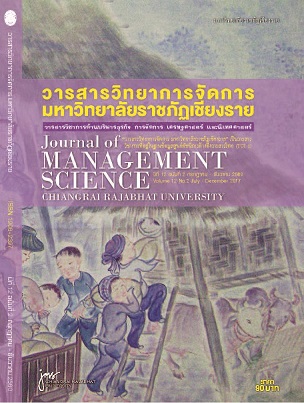The Communication of Way of Life from Past to Present by Using Song of Akha Tribe in Chiang Rai Province
Main Article Content
Abstract
The research entitled “ The Communication of Way of Life from Past to Present by Using Song of Akha Tribe in Chiang Rai Province” aimed to study the song which represented the Akha’s way of life in Chiang Rai province in the past and to study the song which represented Akha’s way of life in Chiang Rai Province in the present. The population of this study was Akha tribe people in 4 villages consisted of Akha Doi Change village, Akha Sean Jai village, Akha Pa Sang village, and Akha Mae Chan Tai village. The sample group was selected from the purposive sampling from the Akha tribe people who understood the song from the past to today. The research instruments were the in-depth interview, focus group and participant observation, then the data were analyzed by using the content analysis. The results of the study appeared that;
1. Akha songs which were sung in the past: it could be seen that the previous songs were sung for 100 years. The contents mainly focused on the way of life, culture, costumes of men and women, including love. Those songs were sung in the community lawn and used for dancing in community lawn or “Deh qahq”. Akha tribe used this lawn for the cultural heritage from the generation to the generation.
2. Akha songs which were sung today could be divided into 2 periods. The first period was the old ethnic songs and the new songs were composed to establish the sense of love of their own ethic group and conserve their own culture. The second period was the present period. The songs were changed rapidly by the adaptation of the melody and style of the western country.
3. From the in-depth interview data, it could be concluded that Akha song in the first period was the cultural rehabilitation. The objective of the collection of Akha songs was to establish the consciousness of being Akha for Akha people to love and conserve their own culture. The songs became popular and being the model for the songs in the second period.
4. From the focus group, it was concluded that the song in the past should be counted that it started from the period that they moved into Thailand since 110 years ago, but some senior people said that some songs were sung nearly 2,000 years old. Although, some songs were sung for a long time, there was no historical evidence to support.
Article Details
Views and opinions expressed in the journal do not necessarily reflect those of the editors.
References
มูลนิธิกระจกเงา โครงการพิพิธภัณฑ์ชาวเขาออนไลน์. (2551). ชนเผ่าอ่าข่า. สืบค้นเมื่อ 20 พฤศจิกายน 2557 ,จาก https://www.openbase.in.th/node/1423.
สวัสดีดอทคอม. (2557). ชนเผ่าอ่าข่า-ประวัติความเป็นมา. สืบค้นเมื่อ 20 พฤศจิกายน 2557,จาก https://www.sawadee.co.th
/thailand/hilltribes/akha.html.
บ้านจอมยุทธ. (2557). ทฤษฏีการสื่อสาร. สืบค้นเมื่อ 9 กุมภาพันธ์ 2558,จากhttps://www.baanjomyut.com
/library/communication_theory/03_2.html.
พิทพงศ์ สะโง้. บทสัมภาษณ์ : เพลงร้องอ่าข่ากับการฟื้นฟูวัฒนธรรม. 3 สิงหาคม 2559.
พีรยุทธ โอรพันธ์. (2556). ทฤษฎีการวิเคราะห์ข้อมูลงานวิจัยเชิงคุณภาพกรณีศึกษางานวิจัยเรื่อง : การสื่อสารระหว่างวัฒนธรรมของชาวไทยเชื้อสายมลายูและชาวมาเลเซียเชื้อสายไทย. เอกสารประกอบการบรรยายรายวิชาสัมมนาการสื่อสาร 1 . พิษณุโลก . มหาวิทยาลัยนเรศวร.
ภัสรา ชนะชัย. (2550). แนวคิดและทฤษฎีการสื่อสาร. สืบค้นเมื่อ 25 ตุลาคม 2554, จากwww.multiply.multiplycontent.com.
สมาคมเพื่อการศึกษาและวัฒนธรรมชาวอาข่า จังหวัดเชียงราย. (2557) .ข้อมูลวัฒนธรรมชนเผ่า
อ่าข่า. เชียงราย : สมาคมฯ.
สำนักศิลปะและวัฒนธรรม. (2554). ยุทธศาสตร์การพัฒนาสำนักศิลปวัฒนธรรม ระยะเวลา 2554 – 2558. เชียงราย : มหาวิทยาลัยราชภัฏเชียงราย.
หกเผ่าชาวดอย. (2550). สืบค้นเมื่อ 20 พฤศจิกายน 2557, จาก https://www.hilltribe.org.
อาทู่ ปอแฉ่. ผู้อำนวยการสมาคมเพื่อการศึกษาและวัฒนธรรมชาวอาข่า จังหวัดเชียงราย.
บทสัมภาษณ์ : บทเพลงร้องชนเผ่าอ่าข่า. 10 กรกฏาคม 2559.
อาพี สะโง้ . บทสัมภาษณ์ : เพลงร้องอ่าข่า. 3 สิงหาคม 2559.
Edward T.Hall. (1981). Beyond Culture. Anchor books. Doubleday.
Geert Hofstede & Gert Jan Hofstede. (2005). Cultures and Organizations : Software of the mind. Revised and Expanded 2nd edition, The McGraw-Hill Companies.
Stephan Dahl. (2005). Intercultural Research : The Current State of Knowledge. Retrieved December 15 , 2012. Website : https://papers.ssrn.com/sol3/papers.cfm?abstract_id= 658202.
Thomas J.Knutson. (2005). Tales of Thailand : Lesson from the land of smile. Retrieved October 10, 2012. Website : www.fulbrightthai.org/data/TALES/THAILAND.doc.


